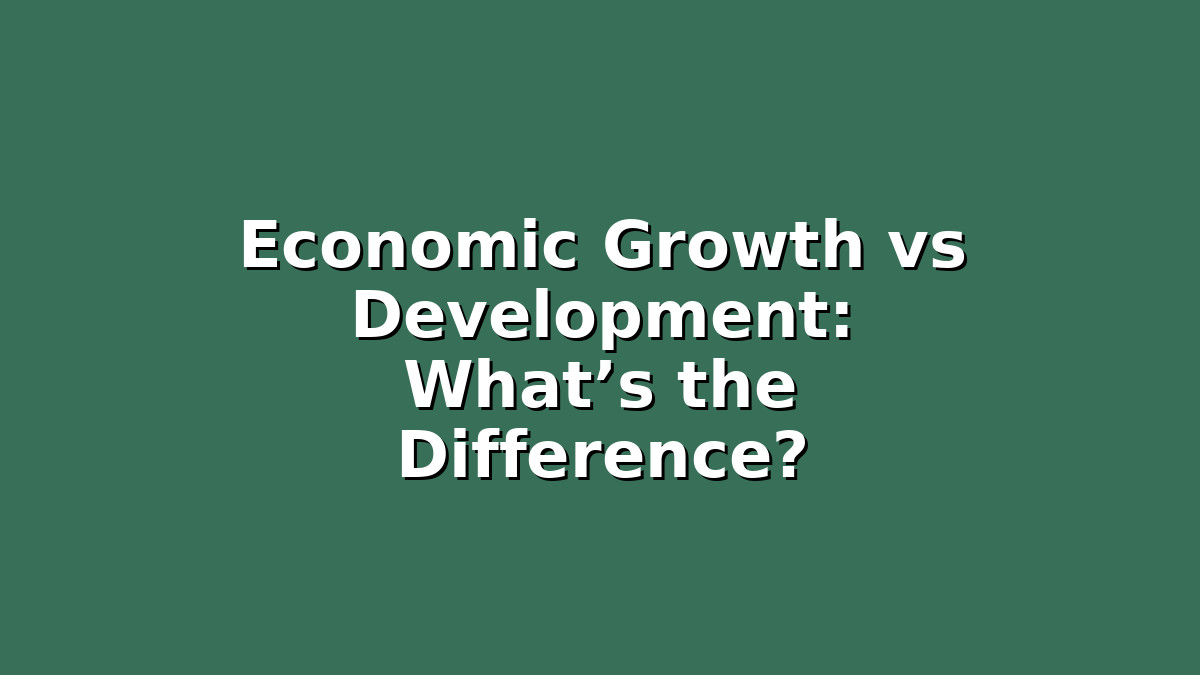When studying economics, especially for exams or class discussions, you will often come across the terms “economic growth” and “economic development.” Although they sound similar and are sometimes used interchangeably, they actually refer to different concepts that are important to understand. Grasping the difference between economic growth and development not only helps you score better in exams but also deepens your understanding of how countries progress over time.
In this article, we will explore what economic growth and economic development mean, how they differ, and why both concepts matter. Plus, we’ll share some study tips to help you remember these ideas and apply them confidently in your exam answers.
1. Understanding Economic Growth: The Basics and Study Tips
Economic growth refers to an increase in a country’s output of goods and services over time. More simply, it means the economy is producing more than before. This growth is usually measured by the rise in Gross Domestic Product (GDP) or Gross National Product (GNP). For example, if a country’s GDP increases from $1 trillion to $1.1 trillion in a year, it has experienced economic growth of 10%.
Key points to remember about economic growth:
– It focuses mainly on quantitative changes (numbers and figures).
– Often measured by GDP, GNP, or per capita income.
– Represents an increase in production and income.
– Does not necessarily indicate improvement in people’s quality of life.
Study Tip:
When revising this topic, try creating flashcards with terms like GDP, GNP, and per capita income on one side and their definitions or significance on the other. Practice explaining economic growth in your own words aloud or to a study partner. This active recall method helps lock in the differences between economic growth and development.
Also, when learning about economic growth, remember to connect it with real-world examples such as China’s rapid GDP growth in recent decades. Relating concepts to current events or historical data can make the topic more engaging and easier to remember.
2. Delving into Economic Development: More than Just Numbers
While economic growth focuses on the increase in economic output, economic development is a broader concept. It includes improvements in living standards, education, health, and overall well-being of people in a country. In other words, economic development means progress in the quality of life, not just the quantity of goods made.
Indicators of economic development might include:
– Literacy rates
– Life expectancy
– Reduction in poverty and unemployment
– Access to healthcare and education
– Infrastructure improvements
For example, a country can have steady economic growth but still face issues like poor healthcare, high unemployment, or unequal income distribution. This means its economic development may be lagging despite growing GDP.
Study Tip:
Create a comparison chart between economic growth and economic development, listing their features, indicators, and examples side by side. This visual aid can clarify the distinctions and make it easier to write structured answers in exams.
Another helpful technique is to use case studies. For instance, you might study India’s economic growth alongside its development challenges to see how the two concepts interact in real life. Writing short summaries of such case studies strengthens your understanding and helps you apply theory to practice.
3. Why Knowing the Difference Matters: Practical Exam and Study Advice
Understanding the difference between economic growth and economic development is crucial for exam success because questions often require you to explain both concepts clearly or analyze the relationship between them. Here are some important reasons and study strategies:
– Answer precision: Exams reward clear and correct definitions. If you confuse growth with development, your answer may lose marks.
– Deeper analysis: Many economics questions ask you to evaluate policies or outcomes. Knowing that growth doesn’t always mean development allows you to give nuanced answers.
– Essay writing: Organizing essays around the difference lets you create a strong introduction, body, and conclusion, improving your overall writing.
Study Tip:
Practice writing short paragraphs or essays explaining economic growth and development. Include examples, definitions, and key indicators. Time yourself to simulate exam conditions. Afterward, review your writing to check if you clearly differentiated the two concepts.
Additionally, try teaching the concepts to a friend. Explaining ideas aloud is one of the most effective ways to solidify your knowledge. If your friend asks questions you can’t answer, note them down and revisit those areas in your textbooks or notes.
Conclusion
Economic growth and economic development are two fundamental but distinct concepts in economics. Growth is about increasing output and income, while development encompasses broader improvements in quality of life. As a student preparing for exams, understanding their difference will help you answer questions more accurately and confidently.
Use study techniques like flashcards, comparison charts, case studies, and teaching others to reinforce your learning. Remember, economics is not just about memorizing terms but about understanding how those terms apply to real-world situations.
Stay curious, keep practicing, and you’ll find that grasping these concepts becomes easier over time. Good luck with your exam preparation!

Responses